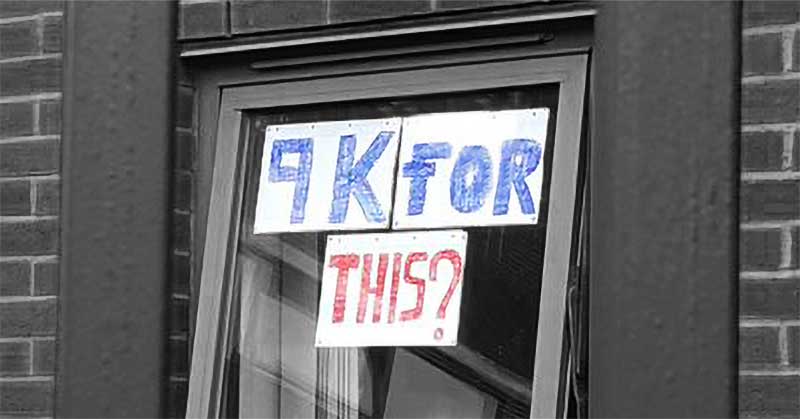

Taking short cuts to protect profits during a pandemic has predictable results. Launching the Eat Out to Help Out scheme, encouraging employees back to work, bullying parents and teaching unions into reopening schools, refusing to provide full sick pay for people with coronavirus symptoms, and the abysmal failure of the privatised Serco test and trace system, all led to a rise in coronavirus infections before students returned.
The number of students going to university this year was inflated by the government’s decision to lift the student cap – prompted by universities’ dependence on student cash in the Higher Education market, as well as the mishandling of A-Level results.
Crammed into halls of residence and forced to attend in-person classes, coronavirus ripped through campuses across the country. Last week 23 universities reported outbreaks, with large numbers of students in Glasgow and Manchester quarantined in halls.
Those affected by these outbreaks have been forced to quarantine in high density residential accomodation. Many have complained of insufficient or inadequate food and a lack of regard from the universities for their mental and physical health. One student reported that despite being a vegetarian Muslim they were expected to eat a ham sandwich. The government and universities knowingly endangered students by encouraging them into a situation where they would be far more likely to catch coronavirus and made no plans to deal with outbreaks.
In response to this entirely predictable outcome, many universities have chosen to move all their classes online. Students have been left paying up to £9250 per year for online classes and over £100 per week for accommodation. Rent contracts are signed for the full year, leaving students contracted to pay thousands of pounds for accommodation which the government and the universities surely knew they wouldn’t need.
While Glasgow University has offered a one month rent refund to quarantined students this paltry gesture is clearly inadequate. Students have responded with a rent strike, demanding that they be allowed to terminate their accommodation contract early and that rents be capped at one third of student loans.
In addition, they want to ensure the university
Spreading the rent strike
On 1 October, the National Union of Students (NUS) and Rent Strike, a national coalition of student housing campaigns, organised a training session for students looking to organise rent strikes. At the event, Larissa Kennedy, the NUS President, identified the situation in student halls as a symptom of the marketisation of education and said, “we need to build a grassroots movement capable of realising a radical new vision of education.”
There are many campaigns with experience of organising rent strikes who can help students organise. Acorn, Living Rent and Rent Strike are all encouraging students to get in touch and can provide legal advice as well help with organising. Students can and should also demand support from their NUS affiliated student union, to provide support and resources to spread the strike.
Students across Britain should organise rent strikes, taking up the demands of the Glasgow campaign and fighting together for common aims. Such a campaign should be led by the rent strikers themselves, with support from the NUS, and coordinated nationally to create the greatest pressure on the government and universities.
A public and democratic education
For years the government has encouraged universities to treat students as customers and education as a commodity. Yet now universities are struggling to deliver that product, students are still expected to pay outrageous amounts of money and take on a lifelong debt. Elite universities like Oxford and Cambridge are sitting on huge wealth reserves, while others are cutting staff and courses. The HE sector is critical to the training of health and education workers, engineers and scientists, who will be needed to organise the democratic, green economy of the future. The fact that students were encouraged to sign rip-off contracts during a pandemic is a damning indictment of a callous government and dysfunctional education system.
The Higher and Further Education sectors should be taken into public ownership, with fees, loans and debts scrapped and students provided with bursaries set at the living wage. This measure, which would also allow students to defer if they want, can be funded by a wealth tax on the capitalists and their corporations which depend on skilled university graduates. On this basis the higher education system can be reformed as part of a democratic plan, under the control of workers and students, to meet the challenges of the pandemic and climate change.
In addition to the demands set out by Glasgow rent strikers, we fight for